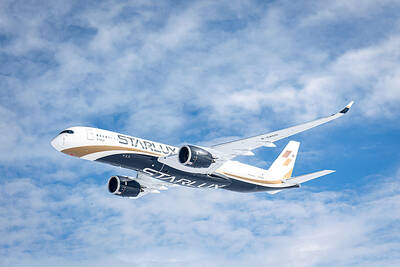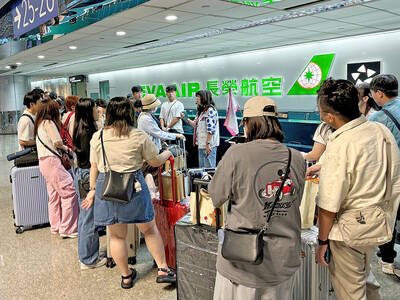The Asia-Pacific Music Collective Management Association (ACMA) has updated its licensing rates for karaoke machines used at KTVs, which would increase the payments for operators.
Licensing fees for for-profit karaoke machines at restaurants would increase to NT$1,000 (US$30.51), those for public entertainment, such as community classes, are to rise to NT$700, while they are to be NT$350 for activity centers.
Holiday Entertainment has about 1,900 karaoke rooms nationwide, so it faces an additional NT$5 million in licensing fees under the new rates, which were announced in December last year.

Photo: Chiu-Shao-wen, Taipei Times
The changes have been met with discontent from KTV operators such as Holiday Entertainment and Cashbox Partyworld Co, as well as the Chinese Music Song and Lyrics Broadcast Association, which have jointly filed a petition with the Intellectual Property Office to review the hikes, sources said yesterday.
It is not the first time KTV operators have protested rate hikes by the association, but provisions of the Copyright Collective Management Organization Act (著作權集管團體條例) show that it can set the licensing rates of intellectual property that it oversees and manages.
Songwriters commonly use collective management organizations to manage their works. The organizations, after licensing the right to use the songs, pay the creators royalties from the proceeds.
The act says that such entities must uphold the rights of public broadcast, public transmission and public performance, with KTV operators required to get licensing rights from them.
The Intellectual Property Office yesterday said that it is obligated to review the issue and decide within four months.
During the review, both sides would be asked to provide further documents as needed, such as KTV song lists and how often songs are used, the office said, adding that delays in providing documents would drag out the review.

An alleged US government plan to encourage Taiwan Semiconductor Manufacturing Co (TSMC) to form a joint venture with Intel to boost US chipmaking would place the Taiwanese foundry giant in a more disadvantageous position than proposed tariffs on imported chips, a semiconductor expert said yesterday. If TSMC forms a joint venture with its US rival, it faces the risk of technology outflow, said Liu Pei-chen (劉佩真), a researcher at the Taiwan Industry Economics Database of the Taiwan Institute of Economic Research. A report by international financial services firm Baird said that Asia semiconductor supply chain talks suggest that the US government would

Starlux Airlines on Tuesday announced it is to launch new direct flights from Taiwan Taoyuan International Airport to Ontario, California, on June 2. The carrier said it plans to deploy the new-generation Airbus A350 on the Taipei-Ontario route. The Airbus A350 features a total of 306 seats, including four in first class, 26 in business class, 36 in premium economy and 240 in economy. According to Starlux’s initial schedule, four flights would run between Taoyuan and Ontario per week: Monday, Wednesday, Friday and Saturday. Flights are to depart from Taoyuan at 8:05pm and arrive in California at 5:05pm (local time), while return flights

Nearly 800 Indian tourists are to arrive this week on an incentive tour organized by Indian company Asian Painted Ltd, making it the largest tour group from the South Asian nation to visit since the COVID-19 pandemic. The travelers are scheduled to arrive in six batches from Sunday to Feb. 25 for five-day tours, the Tourism Administration said yesterday. The tour would take the travelers, most of whom are visiting Taiwan for the first time, to several tourist sites in Taipei and Yilan County, including tea houses in Taipei’s Maokong (貓空), Dadaocheng (大稻埕) and Ximending (西門町) areas. They would also visit

LITTORAL REGIMENTS: The US Marine Corps is transitioning to an ‘island hopping’ strategy to counterattack Beijing’s area denial strategy The US Marine Corps (USMC) has introduced new anti-drone systems to bolster air defense in the Pacific island chain amid growing Chinese military influence in the region, The Telegraph reported on Sunday. The new Marine Air Defense Integrated System (MADIS) Mk 1 is being developed to counter “the growing menace of unmanned aerial systems,” it cited the Marine Corps as saying. China has constructed a powerful defense mechanism in the Pacific Ocean west of the first island chain by deploying weapons such as rockets, submarines and anti-ship missiles — which is part of its anti-access/area denial (A2/AD) strategy against adversaries — the